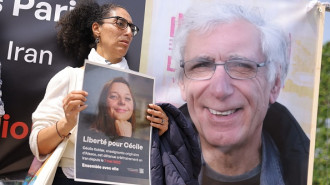Lebanon forms government after months of deadlock
Rival political groups have been locked in disagreement over the make-up of a new government since May, after the country's first parliamentary elections in nine years.
The breakthrough comes after rival factions worked out a compromise allowing representation of Sunni lawmakers backed by the powerful group Hizballah.
Secretary General of the Council of Ministers Fouad Fleifel announced the new government, headed by Prime Minister Saad Hariri late Thursday.
Earlier, three ministers were confirmed as the formation of the Lebanese government picked up pace, local media reported.
Amal Movement's Ali Hassan Khalil is set to retain his post as financial minister in the new government, while Hizballah's Muhammad Fneish will remain as minister of sports and youth and the leader of the Free Patriotic Movement Gebran Bassil will continue serving as the minister of foreign affairs, according to local reports.
On Wednesday, prime minister designate Saad al-Hariri said that this week will be "decisive" in the formation of Lebanon's new government.
"Matters are positive and will become clear within two days… This week is decisive, positively or negatively," Hariri said, adding that he was "cautiously optimistic".
Twitter Post
|
Earlier this month, Hariri warned that a government needs to be formed as the country faces a tough economic situation as a result of the eight-months-long political deadlock.
Lebanon is governed by a complex system that seeks to guarantee a delicate balance of power between religious communities and their political parties, but the result is often drawn-out bargaining.
Political deadlock
The country's parliamentary elections in May were the first for nine years but lawmakers have since failed to agree on a government.
"Lebanon's routine government deadlock and recurring political vacuums are often due to a combination of domestic but also regional political dynamics," Lebanon-based journalist Scott Preston told The New Arab.
"The specific reasons change on a case by case basis but tend to do with the fact that control of the country has been used by foreign powers to curb the influence of neighbourhood competitors or as a bargaining chip for concessions from outside actors."
"The recent deadlock over the distribution of cabinet positions is a case in point," Preston said.
"Earlier in the process the Free Patriotic Movement and the Lebanese Forces were tied up in a dispute over Christian ministerial appointments with domestic concerns at the fore."
The major parties have jostled over the number of cabinet seats they should get, and over the apportionment of the most powerful ministries in the backdrop of current economic climate.
This also follows an international community pledge of up to $11.5 billion in aid and loans for the country during a conference in Paris in April.
But the promised funding is largely destined for infrastructure projects, which cannot be actioned without a new cabinet.
Meanwhile, war-torn neighbouring Syria awaits reconstruction - one that is likely to be witnessed by Lebanon's new cabinet.
"During its term the new government is expected to oversee significant developments, including the profitable reconstruction of Syria so there is a lot on the line when it comes to control of the ministries," Preston told The New Arab.
"By stonewalling, the cabinet formation Syria could try to ensure a Lebanese government that would be malleable to its interests, with the hope of using the country to bargain western powers for sanctions relief."
Follow us on Twitter: @The_NewArab





 Follow the Middle East's top stories in English at The New Arab on Google News
Follow the Middle East's top stories in English at The New Arab on Google News

![The law could be enforced against teachers without prior notice [Getty]](/sites/default/files/styles/image_330x185/public/2178740715.jpeg?h=a5f2f23a&itok=xMdFOAIF)
